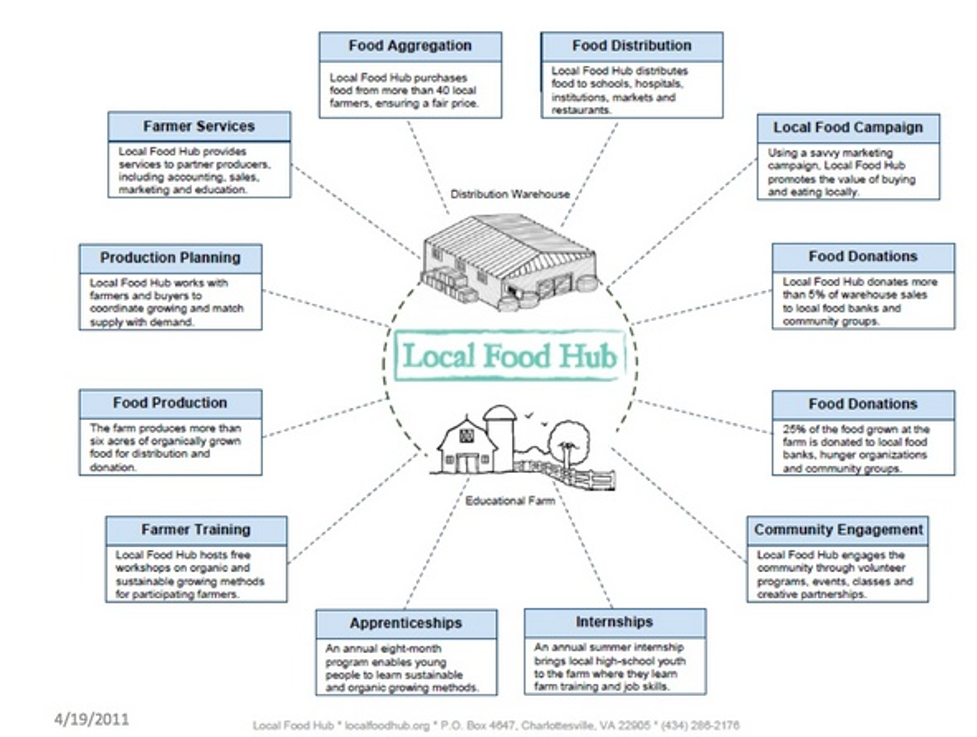
Food hubs are a centrally located facility with a business management structure facilitating the aggregation, storage, processing, distribution, and/or marketing of regionally produced food products. By coordinating these activities, small and mid-sized producers gain entry into new and additional markets that would be difficult or impossible to access on their own. Plus, food hubs simplify the farmer’s distribution process as they are selling to a single entity, rather than individual people or locations, so they can spend more time farming and less time on managerial tasks.
There are a number of key features in successful food hubs. First, food hubs must be financially viable. It is important that food hubs do not buy more space or produce than they are able to sell and that they are able to meet their financial goals in a timely fashion. Second, food hubs must prioritize the well-being of the farmers they are partnering with. There is no food hub without a supply of food, so the farmers needs must be met for the food hub to be successful. Third, while food hubs are a relatively new innovation, there are many sprinkled across the United States, so successful food hubs should utilize the community of alternative food strategies as a resource. This allows them to learn from others’ successes and not repeat their mistakes. While CSAs, farmers markets, and food hubs all work to connect consumers with locally sourced food, food hubs allow for resources and responsibilities to be shared. Food hubs are not necessarily replacing community gardens and farmers markets but are instead supplementing their initiatives and providing an often mutually beneficial strategy for both farmers and larger scale consumers. Recently, the concept of a food hub is being altered and applied to other areas of the food industry. Ghost kitchen food hubs are popping up around the country and are providing chefs a communal space to start and expand their businesses with less capital requirements. Food hubs are not always the right strategy in every community but are a promising tool in the portfolio of alternative food strategies challenging industrial agriculture.
I barely knew anything about food hubs before this, I was just basing all my knowledge on assumptions, so thanks for clarifying that for me! Comparing food hubs and farmers markets was very helpful for understanding the difference and how food hubs take a lot of the burden off of farmers. The list was really helpful too- its good to know how to identify a food hub that’s actually doing good work (and it was a good reminder to always make sure our food sources are putting farmers first!)t! Including the personal anecdotes, = the clips from the Mississippi food hub, and the interview at the end helped paint a picture of how these hubs function; it also made the podcast really engaging and easy to follow. stellar job!
I didn’t know about the Ghost Kitchen food hubs but this is a great way for local chefs to start their businesses without spending as much, therefore giving them more of an opportunity for success. I also did not realize the importance for foods hubs to try to operate year round such as by selling jarred goods from the summer or investing in meat and dairy. I would picture them to be more of a seasonal institution. I loved the variety of the podcast with the music and guests. It kept it engaging.
While I started this podcast with very minimal knowledge about what Food Hubs were and the role they served as an alternative food strategy for our food systems, I ended it with a much greater appreciation and understanding of the potential Food Hubs have to connect small and mid-scale producers with buyers. The combination of your dialogue, read quotes from a variety of sources, and audio snippets from interviews coalesced into a really nice podcast! I especially appreciate the six tips for lasting food hubs and how you connected them back to overall food systems, providing us tangible ways to improve our current systems. Overall, I would say it all came together nicely and the production quality is commendable!
This was great! I especially loved the different voices and perspectives throughout, which provided a diverse range of information on the topic. These various inputs, plus the great music and overall different tones used, really broke up the podcast to make it flow a lot more and engage the listener. Food hubs were also something Isaiah and I briefly touched upon as a potential consideration in supermarket redlining cases, so learning about this even more was super interesting. The six tips to effective food hubs were also some amazing points I definitely got a lot out of and learned from. Either way, great job!